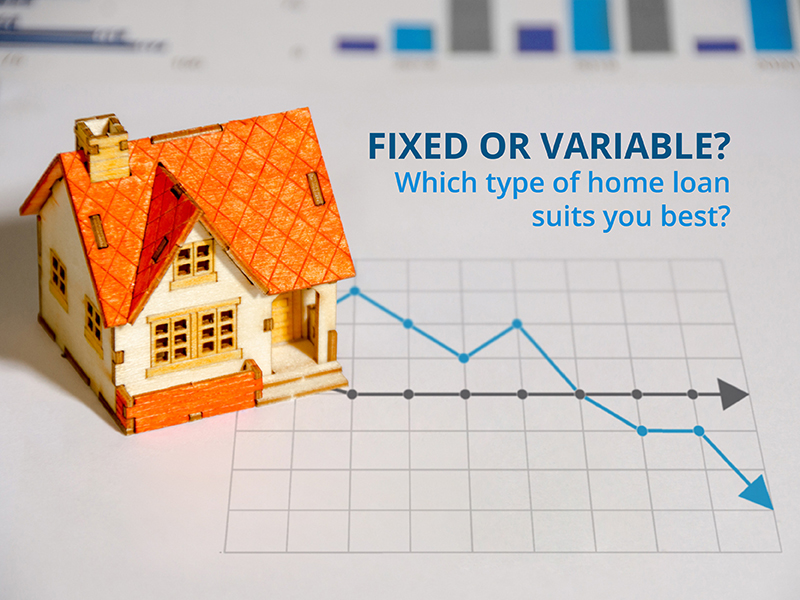
Your choice of home loan is too important to gamble on.
One of the first decisions you need to make is: fixed vs variable home loan. Which is best for you?
When looking at the pros and cons of fixed rate and variable rate home loans, it’s important to weigh up not only the interest rates on offer but other factors too…
Fixed vs variable home loan
There are advantages and disadvantages of each type of loan. These are summarised below.
What is a variable rate home loan?
Repayments can change during the life of a variable rate loan, so you may pay more or less as interest rates rise or fall with market conditions.
Variable home loans tend to be the most popular with borrowers because you always pay market rates.
Studies have shown that, over time, a borrower is likely to pay less interest overall with a variable rate home loan vs a fixed rate loan.
Pros of a variable rate home loan
A variable rate home loan offers the following benefits:
- You always pay “market rates” so you’re not gambling that you know more about the direction of the cash rate than a whole team of bank analysts.
- If the RBA cuts rates, you can benefit from a lower rate if your lender passes the cut on to borrowers.
- There are no break fees for paying extra off your loan, refinancing or closing your loan from selling the property.
- 100 percent offset accounts are available from most lenders.
- Redraw facilities continue to work unaffected.
- Generally, there are no limits to how much extra you can pay off the loan.
- Increased flexibility: you may be able to ask for a repayment holiday if circumstances require it (partner going on maternity leave, temporary loss of job, etc.)
- It is simpler to switch loans to get a better deal at a different lender.
Cons of a variable rate home loan
There aren’t too many disadvantages of a variable rate home loan:
- Your repayments will increase if the RBA increases rates.
- The interest rate may also go up outside of the RBA increasing rates, if any of the following occur: the lender’s wholesale cost of funding increases, regulatory changes occur, shareholders exert pressure or competition decreases.
What is a fixed-rate home loan?
A fixed-rate loan means your interest rate and repayment are fixed for a set period, often between one and five years.
Banks are pretty clever when it comes to knowing which direction interest rates are moving and, more often than not, they will price the fixed rate accordingly.
So, paying the “market rate” is unlikely. Nine times out of ten, it will tip the banks way and you will end up paying more than you should.
Pros of a fixed rate home loan
The benefits of a fixed rate loan are quite limited but include the following:
- You know exactly how much you’ll pay per fortnight or month for the entire fixed period of the loan, which can help with budgeting.
- If interest rates rise, you’re protected from the increase as your repayment will not change.
Cons of a fixed rate home loan
There are a number of disadvantages to be considered when taking on a fixed loan:
- If the RBA cuts rates, you won’t benefit with lower repayments.
- 99 percent of lenders don’t allow you to pay off large chunks of debt without incurring break fees, which can be substantial. Some lenders allow you to pay off small amounts over the life of the fixed term. Westpac, for example, allow you to pay $30,000 off over the term of the fixed period and ING allow you to pay off $10,000 each year of the fixed term. Only a couple of lenders have no restrictions on how much extra you can repay down a fixed loan.
- Generally speaking, offset accounts do not work with a fixed loan. The few that do work offset at a much lower amount at 40 cents in the dollar (40 percent offset) than with a variable rate loan (100 cents in the dollar or 100 percent offset). Only a very small number of lenders allow a 100 percent offset facility on a fixed rate home loan.
- A redraw facility may not be offered with a fixed rate home loan.
- If you repay your loan in full by either refinancing with another lender or selling the security property, you will incur break fees if the lender has restrictions on how much you can pay off the loan.
- When the fixed rate expires, the loan automatically switches over to a variable rate loan and, more often than not, the opportunistic lender puts you on their standard variable rate. This is often very high and, if you aren’t paying attention, it could cost you thousands in unnecessary interest.
Considering your options? Fixed vs variable rate loan?
Are you in the process of evaluating your home loan options?
If you’d like to speak to one of our expert mortgage brokers to discuss the two different rate types, please contact us here.
